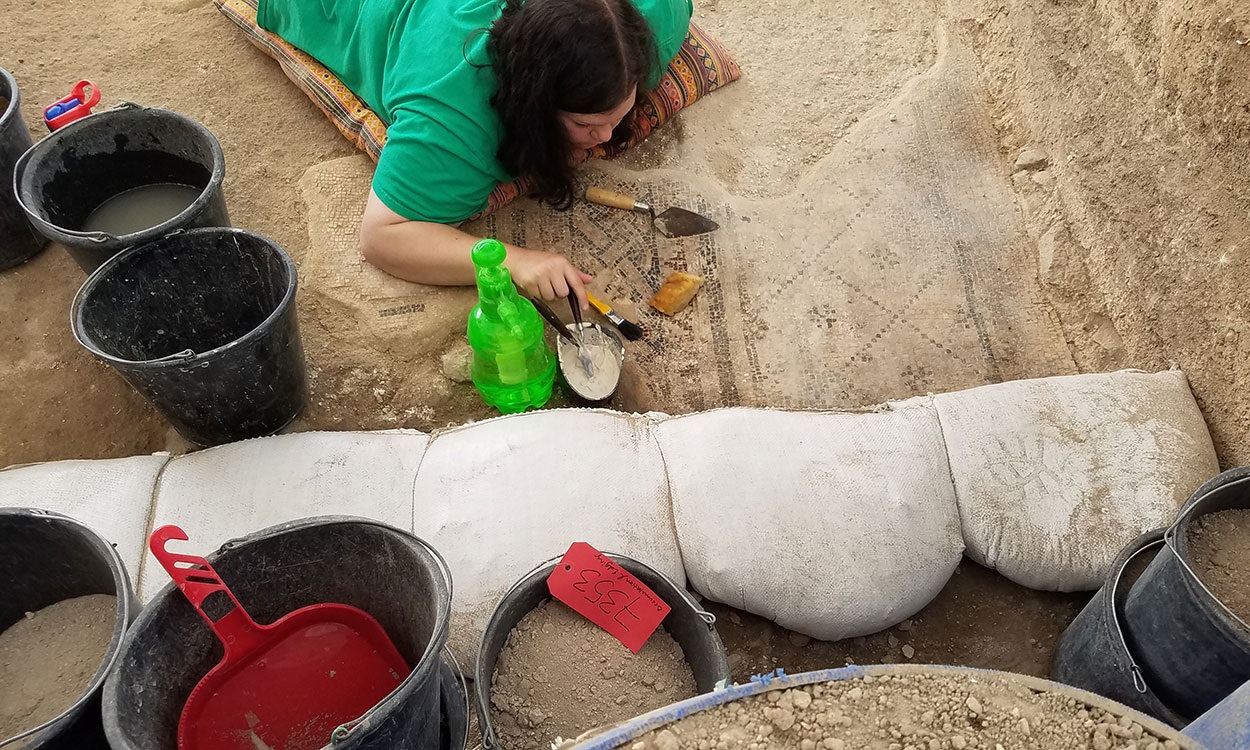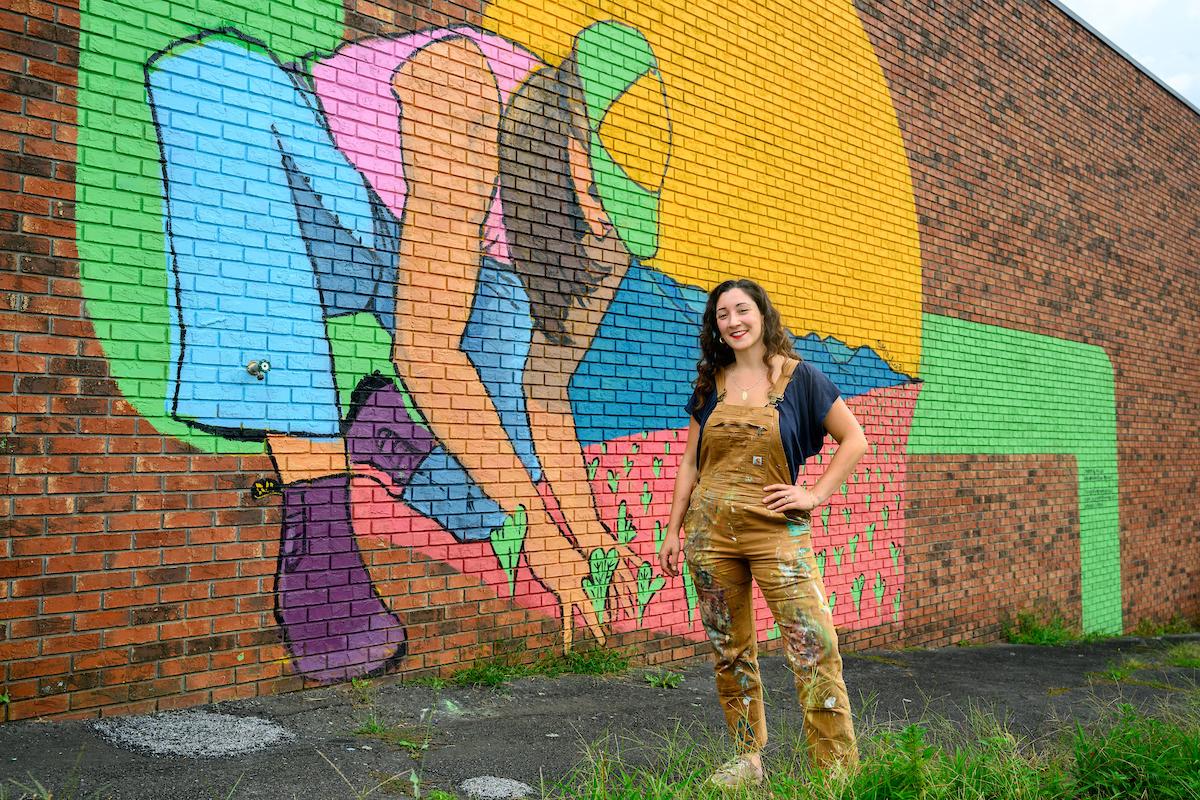Faculty, students collaborate for fourth Summer Undergraduate Research Program

Connor Henderson works on conservation aspects of a mosaic border in an ancient synagogue at Huqoq, Israel.
The Summer Undergraduate Research Program is underway for the fourth consecutive year at Western Carolina University.
The program is an initiative overseen by the university’s Honors College and the Office of the Provost, and is open to all WCU undergraduates. To be considered for the program, current students interested in participating had to identify a faculty member with whom they wished to collaborate and submit a proposal describing their research project and its goals during January and February. Students selected to participate had their proposals reviewed by a committee of faculty representatives from each college on campus.
To be selected to participate is a great accomplishment, said WCU undergraduate research coordinator and program organizer Kloo Hansen, as only 10 students and their faculty mentors were chosen out of 21 submitted proposals, a record number for the program. This year's participants represent every college on campus with a wide variety of research topics to be investigated.
Faculty members and students are receiving stipends for their research work and enjoy various programming and professional development opportunities. Some of the opportunities include a specialized poster writing and presentation workshop, as well as a tailored resume writing workshop where students can create a resume with a research focus.
Scottie Kapel, assistant professor and outreach and scholarly communication librarian with Hunter Library, and Carrie Hachadurian, student development coordinator from WCU’s Center for Career and Professional Development, work closely with Hansen and Jill Granger, dean of the Honors College, to develop the workshops for the participating students. The students also get to enjoy a hiking excursion to Waterrock Knob on the Blue Ridge Parkway and social events throughout the summer program to build a community of inquiry.
The 2019 research projects and team members (participating student, faculty mentor) are:
- “Humor Styles and Happiness among People with Chronic Illness,” by Audre Tyner, a junior psychology major living in Cullowhee; Tom Ford, psychology professor.
- “Investigation of the Importance of DNA Polymerase I and III Enzymes in Mycobacteriophages,” by Dylan Rood, a senior chemistry major from Gainesville, Georgia; Jamie Wallen, assistant professor of chemistry and physics.
- “Validation of a Behavioral Health Screening Instrument for Latinx Populations,” by Matthew Dodge, a senior psychology major from Stanley; David McCord, professor of psychology.
- “The Shape of Springs: Linking Landscape Characteristics and Stream Water Temperature in Headwater Mountain Streams,” by John Morgan, a senior geology major from Kernersville; J.P. Gannon, assistant professor of geology.
- “Assessment of Thirty Years of Federal Water Pollution Prosecutions Pertaining to Areas of High Water Scarcity,” Dakota Little, a junior geology major from Jefferson; Andy Hansen, assistant professor of criminology and criminal justice.
- “Random Number Generation Using Cellular Automata,” by David Walsh, a junior computer science major from Sylva; Andrew Penland, assistant professor in math and computer science.
- “Investigating the Impact of Friction, Internal Resistance, Mass and Control Theory on Rotational Wave Energy Conversion System’s Peak to Peak Power Fluctuation,” by David Inscoe, a senior electrical engineering major from Henderson; Andy Ritenour, assistant professor of engineering, and Bora Karayaka, associate professor of engineering and technology.
- “Technology of Ancient Mosaic Production: Huqoq Excavation Project, Lower Galilee, Israel,” by Connor Henderson, a junior environmental health and art major from China Grove; Karen Britt, senior scholar in visual culture in the School of Art and Design.
- “The Test Option Movement and Student Debt,” by Alexia Bevers, a senior finance major from Mount Airy, Georgia; Sean Mulholland, professor of economics.
- “Researching and Preventing Food Insecurity in the Jackson County Area,” by Mary Cooper, a senior nutrition and dietetics major from Clyde; Elizabeth Wall-Bassett, associate professor of health sciences.
At the end of the eight-week experience, the students will formally present their research findings at the 2019 Summer Undergraduate Research Symposium, to be held July 24 in Brown Hall’s Sunset Room.
“I never imagined that I would have this opportunity in my life,” said Henderson, speaking from Huqoq, a small village located near the Sea of Galilee in Israel. Her summer project involves ongoing archaeological work at a fifth-century synagogue holding floor mosaics depicting both biblical and nonbiblical scenes. Britt, her faculty mentor, has been involved with the antiquities research and field school there since 2012, as the mosaics specialist.
“It has given me hands-on experience, and I have learned things about art history and history that I would never be able to learn from reading a book,” she said. “I have met students from all over the U.S., Canada and Europe as well as the Israelis who are part of our team. It has been fascinating to live in another culture where English is not the main language and the food is different. I have only been here for two weeks and feel like there is still so much to learn.
“I have never done this kind of work, and it is much more detailed than I realized. But, it is amazing to see the mosaics come to life after being covered with dirt for over a thousand years,” Henderson said. “How could a small village afford to build such a large building and decorate it with these colorful mosaics? It shows that people who lived in the past were just as creative as artists today.”
For more information about the program, contact Hansen at 828-227-2010 or kchansen@wcu.edu.

